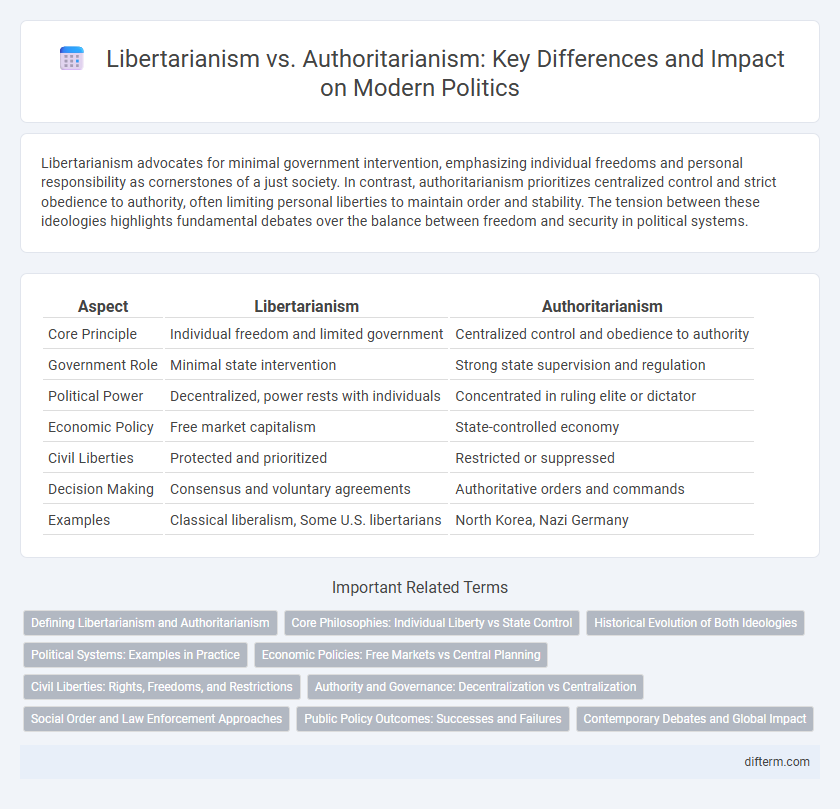Libertarianism advocates for minimal government intervention, emphasizing individual freedoms and personal responsibility as cornerstones of a just society. In contrast, authoritarianism prioritizes centralized control and strict obedience to authority, often limiting personal liberties to maintain order and stability. The tension between these ideologies highlights fundamental debates over the balance between freedom and security in political systems.
Table of Comparison
| Aspect | Libertarianism | Authoritarianism |
|---|---|---|
| Core Principle | Individual freedom and limited government | Centralized control and obedience to authority |
| Government Role | Minimal state intervention | Strong state supervision and regulation |
| Political Power | Decentralized, power rests with individuals | Concentrated in ruling elite or dictator |
| Economic Policy | Free market capitalism | State-controlled economy |
| Civil Liberties | Protected and prioritized | Restricted or suppressed |
| Decision Making | Consensus and voluntary agreements | Authoritative orders and commands |
| Examples | Classical liberalism, Some U.S. libertarians | North Korea, Nazi Germany |
Defining Libertarianism and Authoritarianism
Libertarianism emphasizes individual freedom, limited government intervention, and the protection of personal liberties as fundamental principles. Authoritarianism prioritizes centralized power, strict government control, and limited political pluralism to maintain order and authority. The ideological divide hinges on the balance between personal autonomy and state control.
Core Philosophies: Individual Liberty vs State Control
Libertarianism emphasizes individual liberty, advocating for minimal government interference in personal freedoms and economic activities. Authoritarianism centers on state control, prioritizing order and authority often at the expense of personal autonomy. The core philosophical divide lies in balancing personal freedom against centralized power.
Historical Evolution of Both Ideologies
Libertarianism emerged prominently during the Enlightenment, advocating individual liberty, limited government, and free markets, influenced by thinkers such as John Locke and Adam Smith. Authoritarianism, with roots in ancient civilizations and further shaped by Machiavelli and Hobbes, emphasizes centralized power and control to maintain order and stability. Throughout the 20th century, libertarianism gained traction through classical liberalism and the American libertarian movement, while authoritarian regimes expanded under totalitarian leaders like Stalin and Mussolini.
Political Systems: Examples in Practice
Libertarianism emphasizes individual freedom and minimal government intervention, as seen in countries like Switzerland where decentralized governance and personal liberties are prioritized. Authoritarianism features centralized power with limited political freedoms, exemplified by regimes such as North Korea, where state control dominates social and political life. These contrasting political systems affect economic policies, civil rights, and citizens' participation in governance globally.
Economic Policies: Free Markets vs Central Planning
Libertarian economic policies emphasize free markets, minimal government intervention, and individual entrepreneurship to drive innovation and economic growth. Authoritarian regimes often implement central planning, controlling resources and production to achieve state-defined goals, which can stifle market efficiency and limit personal economic freedom. The tension between libertarianism and authoritarianism fundamentally shapes debates on regulation, property rights, and the role of government in economic development.
Civil Liberties: Rights, Freedoms, and Restrictions
Libertarianism emphasizes the protection of civil liberties by advocating minimal government interference in individual rights, including freedom of speech, privacy, and personal autonomy. Authoritarianism prioritizes state control and security over personal freedoms, often imposing strict restrictions on speech, assembly, and dissent to maintain order and power. The tension between these ideologies centers on balancing individual freedoms against government authority, affecting legislation and civil rights enforcement worldwide.
Authority and Governance: Decentralization vs Centralization
Libertarianism advocates for decentralization of authority, emphasizing individual autonomy and limited government intervention, which fosters local governance and personal freedoms. Authoritarianism supports centralization of power, where a strong central authority controls political and social structures to maintain order and enforce uniform policies. The fundamental conflict lies in balancing governance efficiency with preserving individual rights, shaping how societies distribute power and regulate inhabitants.
Social Order and Law Enforcement Approaches
Libertarianism advocates minimal state intervention in personal freedoms, emphasizing individual autonomy and voluntary cooperation for social order, often preferring decentralized law enforcement. Authoritarianism prioritizes centralized control and strict enforcement of laws to maintain order and suppress dissent, relying on extensive surveillance and harsh penalties. The contrasting approaches reveal fundamental differences in balancing freedom and security within political systems.
Public Policy Outcomes: Successes and Failures
Libertarianism often prioritizes individual freedoms and limited government intervention, resulting in policies that promote free markets and personal liberties but sometimes face challenges in addressing social inequalities and public goods provision. Authoritarianism, with its centralized control, can swiftly implement large-scale infrastructure projects and social programs but frequently suppresses dissent and curtails civil rights, leading to potential human rights abuses. Public policy outcomes in libertarian systems tend to enhance economic innovation and personal autonomy, whereas authoritarian regimes may achieve rapid development at the cost of political freedoms and social justice.
Contemporary Debates and Global Impact
Libertarianism advocates for minimal government intervention and maximal individual freedom, contrasting sharply with authoritarianism, which prioritizes state control and centralized power. Contemporary debates focus on the balance between security and liberty, especially in the context of digital surveillance, censorship, and public health mandates. Globally, these ideological clashes influence governance models, affecting policy decisions in countries like the United States, China, and Russia, shaping international relations and human rights discourses.
libertarianism vs authoritarianism Infographic

 difterm.com
difterm.com